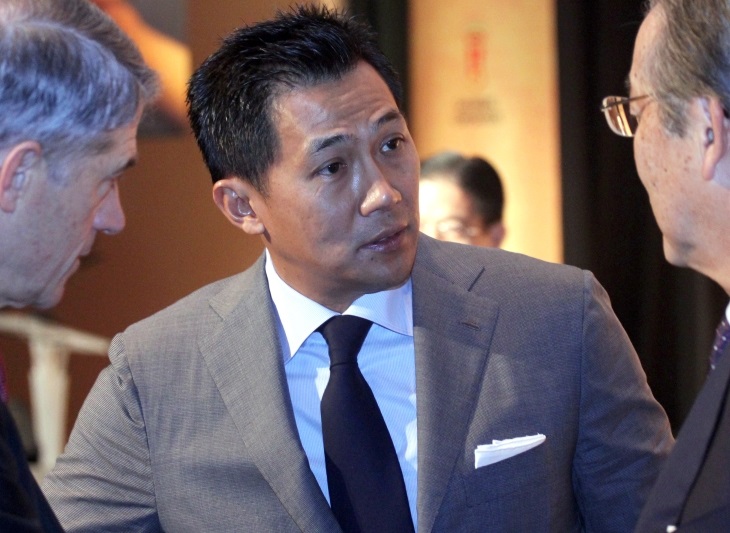Renewed action for a resilient Asia-Pacific: business council chair

We need to work together to ensure our growth is not only more secure and resilient... ...but, more importantly, we have to look at continuing to build opportunities for trade and investment.
Wishnu Wardhana predicts a pivotal year for APEC and its business advisory council. With the global economy still fragile, the Indonesian businessman says the Asia-Pacific must continue to lead the recovery, with balanced and more sustainable economic growth. That means APEC and the APEC Business Advisory Council (ABAC) should take renewed action together this year to help the region’s economies build resilience to any crisis unfolding around the globe.
As the new chair of ABAC, and with his home economy hosting APEC in 2013, Wardhana plans to do just that.
“We are all aware that the global economy is dynamically changing,” says Wardhana, Group Co-CEO and Vice President Director of Indika Energy, an Indonesian-based conglomerate, whose companies focus on the energy and mining industries.
“In this respect, ABAC’s priorities in the coming year will focus on economic growth in the short as well as the longer term. This is why we have put forward the themes for 2013 of partnership, resilience and bridge to growth.
“We need to work together to ensure our growth, especially in the Asia-Pacific region, is not only more secure and resilient in order for us to continue to drive regional prosperity and the international economy, but, more importantly, we have to look at continuing to build opportunities for trade and investment.”
Wardhana, together with his ABAC colleagues who are holding their first meeting of the year this week in Manila, will provide valuable advice and information about the region’s business needs to all levels of APEC, from the leaders who appointed them to ministers and senior government officials.
ABAC will focus on the need to deepen regional economic integration to build new opportunities for trade and investment. A second priority is promoting investment in infrastructure projects to improve connectivity – of goods, services and people - in the vast region, part of the wider agenda to “underpin our resilience for the future.”
Wardhana singles out the Asia-Pacific Infrastructure Partnership, an ABAC-led initiative aimed at raising awareness of obstacles holding back greater private investment in public infrastructure projects. As part of the initiative, a panel of experts, including from the banking, asset and property management, legal and engineering sectors, has held dialogues with government officials on issues such as secure funding arrangements, robust legal frameworks for public-private partnerships and adequate and transparent regulatory frameworks, including for government procurement processes.
“The third focus is fostering small, medium and micro enterprise development as well as entrepreneurship so that more businesses in our economy have the capability to contribute to and benefit from growth,” Wardhana continues.
In the region, small and medium enterprises (SMEs) account for around 90 percent of all businesses and employ as much as 60 percent of the work force. At present, however, they generate only around 30 percent of exports.
“And the final priority is promoting the development and integration of regional financial markets,” he says. Strong capital markets in Asia-Pacific economies are vital for the funding of infrastructure, expansion of enterprises and for building resilience to crises outside the region. APEC has adopted an ABAC proposal to host an Asia-Pacific Financial Forum in Sydney this year as a key step to developing strategies to build these markets.
“All four ABAC priorities complement APEC’s agenda for the year,” Wardhana says. APEC’s theme in 2013 is “Resilient Asia-Pacific: Engine of Global Growth” with three priorities aimed at achieving this: Attaining the Bogor Goals, Achieving Sustainable Growth with Equity and Promoting Connectivity by enhancing supply chain connectivity in the region.
Indonesia takes the helm of APEC almost two decades after it first hosted in 1994 when Leaders forged the Bogor Goals, in the Indonesian city of Bogor, which laid the foundation for open trade and investment in the region. Developed economies agreed to work to achieve free and open trade by 2010 and developing economies by 2020.
Wardhana says Indonesia is committed to hosting a productive year for APEC because Indonesia has a big stake in the region’s future growth. With its large and young population, Indonesia understands the importance of ongoing economic reform for growth. The economy was one of the worst hit by the 1997-1998 Asian financial crisis. But with a determination to reform and a commitment to integration, Indonesia forged a stronger, more resilient economy.
“We believe that Indonesia cannot continue to grow without the region around us also growing as well. Indonesia works in the global economy through G20 and other institutions “but we understand that the region of economic growth will be very much in the Asia-Pacific, and so APEC has a critical role to play,” he says.
Wardhana, graduated from Pepperdine University in California, the United States, with an economics degree in 1993. He returned to Indonesia, working at different energy companies before joining Indika Energy where he was appointed Director in 2007 and Vice President Director in 2009. Today he also serves as the Group Co-CEO for the integrated energy company, whose portfolio covers energy resources, services and infrastructure.
“Based on my experience of growing up and living in a developing economy and working in a global industry, I hope I can bring all sorts of ideas and inputs to the table,” he says.
And he is looking forward to helping forge a stronger ABAC-APEC partnership in 2013 to tackle the challenges facing the region for future growth and prosperity. “It’s going to be very important to work together to make progress on the big reforms and initiatives,” he concludes.

